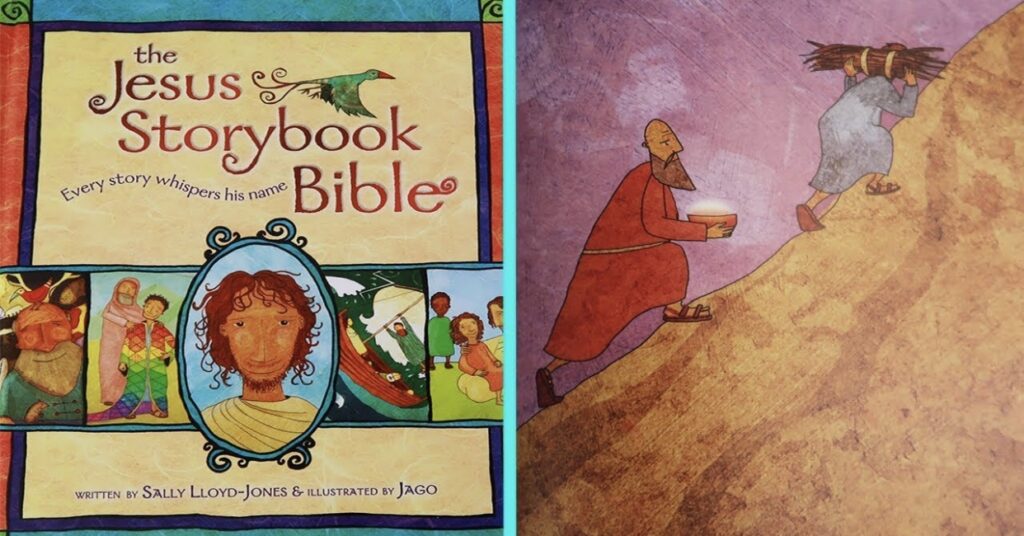By Cody Libolt

In the previous article, it was demonstrated that “The Jesus Storybook Bible” used propaganda through reimagined Bible stories to make a case for social justice warriors.
The following will address some of the concerns (among many) that can be found within its pages.
After taking a closer look, it can be summed up that this book should have been called The God Can’t Not Love You Storybook Bible: Every Story Whispers the Great Reversal of Status.
The book is a frightening model of just how much a person can work to change the clear emphasis and intention from the original author in order to fit the popular narratives of the emergent church.
What is the grand sweep of Lloyd-Jones’ story? It’s a lot like the grand sweep of the real story. But it’s also tweaked. There is an overbearing emphasis on the “Great Reversal” theme. This good theme is found in Scripture, but the book makes it out to be the main point — even going so far as to write it into the narrative where it doesn’t exist.
Here is the most blatant (but not the most important) instance of adding to Scripture in order to add a point not intended by the author. You will find the same kind of pattern throughout.
This is a problem because it amounts to putting words into the mouth of God that he did not himself speak.


The biblical narrative says nothing about a young, socially unimportant little servant girl going through a process of forgiving Naaman. Why does every story have to whisper that the elites are not noble and that the underclass are truly the people of God?
Notice the careful selectivity of the stories.
There is hardly a single story that isn’t seemingly included for its ability to convey Lloyd-Jones’ stated goals of “inclusion and representation.”
There’s nothing about God making Abraham or Solomon wildly wealthy. Nothing about God blessing David with courage and skill.
This David is “teenie weenie.” There is nothing about the parable of the talents, or any of the passages that a Neo-Marxist would consider “elitist.” The main feature in Sally Lloyd-Jones’ narrative is the lowly and outcasts being liberated — to the exclusion of other themes.
Not that the theme of the “Great reversal” doesn’t appear in the Bible. It does, and it is glorious.
My soul glorifies the Lord and my spirit rejoices in God my Savior, for he has been mindful of the humble state of his servant. From now on all generations will call me blessed…
He has brought down rulers from their thrones but has lifted up the humble. He has filled the hungry with good things but has sent the rich away empty” (Luke 1:46–48, 52–53).
Praise God for such passages. Praise God for what he does for the lowly. But also praise God for what he does for those who are prosperous or esteemed by worldly standards.
- Let the story of Naaman the general be a story about Naaman the general.
- Let Jacob the Patriarch’s story be about Jacob the Patriarch (not poor Leah).
- Tell the story of Job, who lost his enormous riches and blessings and then gained them back by remaining faithful to God.
- Tell about Joshua’s heroic conquest of Canaan and about the courage of the spies and the shrewdness of Rahab.
- Tell about the boldness of Elijah or Gideon.
- Tell about the honorable life shown in the Proverbs.
- Tell about the faith of Samuel, David, Daniel, or the elite Roman centurion.
- Tell about the generosity of those who sold land to support the founding of the church.
- Tell about the influence of Lydia, Dorcas, Cornelius, and both Philip and the Ethiopian eunuch.
The Bible gives many examples of the “Great Reversal.” But it also teaches that we should be oriented toward values (Matthew 6:20), and we should celebrate, not derogate, the glory that God works in human beings (Romans 8:18).
Why stack every reference to the “Great Reversal” theme into a single book to the exclusion of other themes and call it a “Bible”? Why emphasize only the parts of Scripture that most accord with the message that we are already hearing from the neo-Marxists? Why add material that doesn’t even exist in order to drive the narrative in that direction?
Our use of discernment (Hebrews 5:11-14) ought to have caught this a long way off. Sally Lloyd-Jones is not the person you should trust to teach your children about God or Sacred Scripture.
[Editor’s Note: Reprinted with permission]











